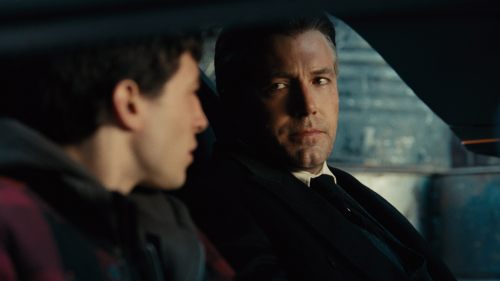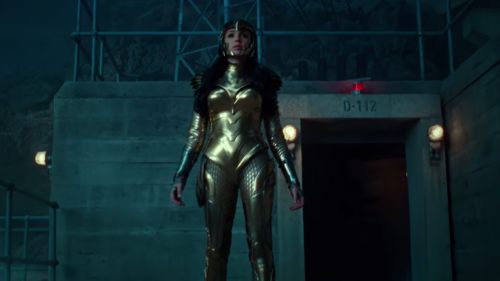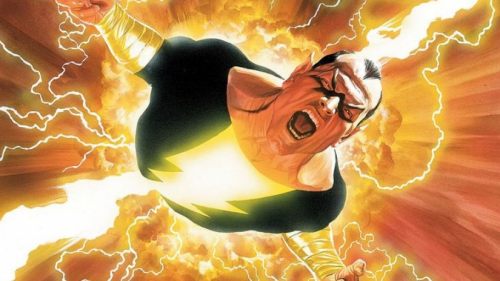WONDER WOMAN: Re-Constructing Idealism
SPOILERS for Wonder Woman below!
Wonder Woman exists at the nexus of God and superhero, making her the platonic ideal of what the DC pantheon has to offer. The Justice League are Gods that walk among us, embodiments of broad, even abstract concepts thrust into turmoil when set against villainous backdrops that test their ideology - both the personal ideologies of the characters themselves, as well as the ideas they represent. It's for this reason, in addition to the filmmaking itself, that Wonder Woman is the platonic ideal of a DC movie, but what separates it from the superhero crowd is its laser-focus on the shifting nature of idealism.
Since her origin nearly eight decades ago, Diana Prince's function is to offer untainted perspective. Most notably, her Amazonian mythology and subsequent introduction to human society make her a uniquely feminist narrative device, placing her in a world of men after having grown up without patriarchal influence. This thread is carried over admirably in Patty Jenkins’ blockbuster, and while it's part and parcel of her definitive call-it-like-it-is demeanor, it's that same notion of a perspective untouched by outside influence that proves to be her biggest hurdle. Her idealism is embryonic.
The film uses "men" interchangeably, sometimes focusing on the male gender and the social rules imposed on women, while other times referring to humankind in totality. This blurs the line between her gender commentary and her use as moral barometer, positioning her as a character meant to question our binary way of thinking. From a young age, Diana was indoctrinated into believing a strict moral dichotomy, wherein "man's" inherent goodness was a default setting that had been corrupted by Ares, the God of war. Her idealism comes off as naïve by design, with notions of absolute truth and absolute justice remaining untested until she wades her way into the complexity of full-scale military conflict. And yet, the film never tears down her ideology. It merely shifts the needle of her praxis.
It's easy for Wonder Woman to believe in people, at least at the very outset. She began her life in a bubble – Themyscira, while an earthly paradise, is obfuscated by a protective dome – and it was in that bubble that she had infinite knowledge at her fingertips. History, biology, mythology, linguistics, all as accessible to her as Wikipedia (the simplistic moral approach the film condemns, while suited to religious parallels, is notably similar online callout culture), but the difference between knowledge and wisdom is experience, and in a global sense, Diana lacks this. The one arena in which she’s truly skilled is the art of combat, trained by the very best to be even better. Even before she was allowed to practice, she took inspiration from her aunt Antiope and the other Amazon warriors, mimicking their every move from afar. Alongside her deadly skill with a spear, she’s taught to wield honesty and fairness. If there’s one thing she knows above all else it’s that she’s a hero, ready to leap to anyone’s aid should they need it. But who is she really fighting for?
A starting point of kindness and heroism already separates Wonder Woman from the other films in the DCEU, but it’s not a constant that goes unchallenged. She’s a warrior, but she can only see things from a warrior’s perspective. It’s only when Chris Pine’s Steve Trevor introduces her to his ragtag group of soldiers that she begins to see what war is to other people, and the smaller battles they face every day. For Trevor, a spy, it’s a duty the same way it is for Diana, but it’s one he must approach with tact and long-term caution because of the horrors he’s seen. For Saïd Taghmaoui’s Sameer, a dark-skinned actor who can’t find work in a white status quo, it’s an opportunity to find a place among his fellow men and be seen on an equal footing. For Eugene Brave Rock’s smuggler The Chief, it’s a means to find a new home and help others find theirs after he had his stolen from him. For Ewen Bremner’s expert marksman Charlie, the only self-professed soldier of the bunch, it’s a struggle because of his PTSD. The strict purity of her ideals cannot apply to them. Not after all they’ve been through.
These men are inspired by Wonder Woman’s bravery and her commitment to her cause. They follow her into battle, and when they can’t take out an enemy sniper, they gather to form a literal support structure so she can wreck an entire bell tower, and they even inspire her in return by the end. But the function they serve for Diana herself is one of changing perspective. The moral absolutism with which she was raised demonizes anyone whose goals and methodology differ from hers. If they aren’t willing to jump headfirst into the eye of the storm, then they must be thieves, murderers, war profiteers and nothing more. There was no complexity in the tales she grew up with, no multitudes to Gods or humans, and she firmly believes her mission to destroy Ares will end the war by freeing men from his influence. But the truth is always more complicated. A figurehead is never the only problem.
The purely Good & Evil dichotomy through which she sees the world is first challenged in London. The British Generals debate the specifics of armistice while separating themselves from the actual conflict, and from the individual lives in danger. Diana is correct, morally speaking, to point this out. Amazonian generals would charge headfirst into battle alongside their soldiers. There is value placed on each life in Themyscira, and absolute pillars of right and wrong to back up their methodology. Yet here sit the ostensible “good guys,” debating war like it’s a game of chess and scoffing at the presence of a woman. Her first brush with shades of grey.
Steve Trevor lies to the war council about his plans. Upon discovering his dishonesty, it’s the only way she can see him until he proves his intentions with the Lasso of Truth. It’s a minor instance, but it’s a microcosm of an intrinsic worldview she’ll soon have to confront. She sees men as either deserving or undeserving of her divine rescue (something her mother instills in her right before she leaves), with the “undeserving” extreme being a function of Ares. Ironically, while everyone but Diana knows this to be untrue, this is the same way Ares views humanity. An imperfect creation of Zeus, petty, violent and unworthy of existence, and he makes it his mission to prove it. When Diana is first confronted with the failure of good men – Steve could’ve stopped the destruction of the Belgian village if he hadn’t stuck to the bigger mission of ending the war – her faith in humanity is truly shaken. She believes him to be under Ares’ influence as well, as no good man would allow loss of life under any circumstance.
It’s a shock to her system and to everything she believes, a clash of the purity of ideals with a discernibly ugly reality, and it’s here that Ares finally confronts her. He reveals his methodology (along with his own complexity that she hadn’t considered - a desire to prove himself right to his father), and fashions a protective armour from the shards of a war that humanity brought on itself. Diana’s battle throughout her journey comes to a head: at her lowest and most defeated, she’s not only forced to confront the darkness in people, but the darkness within herself.
Diana once believed she and her fellow Amazons were pure, incorruptible beings created for a singular purpose. Ares represents all that she opposes, but he’s also revealed to be her blood. It isn’t just her worldview thrown into turmoil, but the way she sees herself. Whatever is within Ares must exist in her too, and Ares is acutely aware of this. After Steve’s noble self-sacrifice to save everyone in the area, Diana has the pain of loss added to her ever-growing pile of misery. It’s the enemy soldiers who stole him from her, the warmongers and weaponeers who forced him to take his own life, so she begins to wreak havoc on them.
Pain fuels her fiery rage, and as she lifts a tank over the head of a helpless Doctor Poison, Ares tempts her to give in to her hatred. These men are undeserving of love. Doctor Poison is undeserving of mercy. Diana deserves better than a race of people who squabble and fight and fail… but it’s not about deserve. It’s about belief. It’s about trading in transactional morality for the sort of kindness that only comes with understanding. Charlie, Sameer and The Chief had their own ignoble conquests, but at the very end, they fight by each other’s side to save other people in the face of certain death. Doctor Poison’s mask gives way among the flames. This murderous scientist is revealed to be scarred and human underneath, acting not out of “evil,” but pain. A reflection of what Diana might become if she lets her pain consume her.
Steve Trevor was fallible. His “greater good” thinking led to the death of innocents, but it was that same thinking that led him to sacrifice himself in place of Diana. His love for her was unselfish, and came from a place of believing in all that she was capable of. Steve was only a man. All he could do was save the day. But Diana is a God. A warrior. A superhero. She can save the world, if she continues to believe in it. If she continues to believe in people despite the darkness within them. Despite the darkness within herself. If she chooses love despite having every reason to hate.
Most of us wouldn’t. Wonder Woman does.
Diana ends the film as she began it, ready to fly into the face of danger and be a hero to those in need. That’s something that will never change about her, even though it’s put to the ultimate test. What does change however, is whom she sees as worthy of her heroism. Her unwavering commitment to her ideals has been tested in the flames of humanity and all its horrors, and while she’s forced to change her perspective to accommodate the experiences that challenge it (her own, as well as those of whom she once condemned), she does not abandon her beliefs, but wields them more skillfully. She has a more complex understanding of the world and of people, one that upon first glance should not gel with the kind of absolutism she continues to adhere to. If anything, it only strengthens her ideology. She knows who she's fighting for after having lived among them.
Wonder Woman is still a symbol of justice, a seemingly paradoxical embodiment of absolute power and absolute mercy, but her absolutes are no longer applied to humanity. What we believe may be absolute, but we are not absolutes ourselves. We are both good and evil. Both light and dark. Both love and hatred. And we are all worth saving as long as the Wonder Women among us (and within us) continue to believe it.



